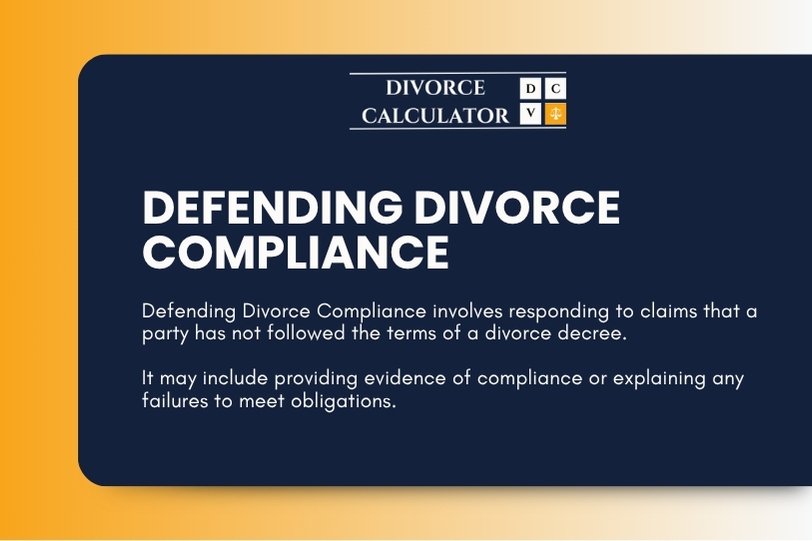Navigating a divorce involves complying with court orders and legal agreements, but misunderstandings or mistakes can quickly lead to accusations of noncompliance. It’s essential that we understand how to defend ourselves and remain compliant to avoid further legal or financial complications. Addressing these challenges requires clear communication, thorough documentation, and a proactive approach.
We often face complex requirements, from child support payments to property division, and even minor errors can escalate if not handled correctly. By learning effective strategies for defending our actions and showing a pattern of good-faith compliance, we can protect our interests and maintain our legal standing.
Let’s explore practical steps and common pitfalls so we’re better equipped to handle compliance issues if they arise during or after the divorce process.
Key Takeaways
- Divorce compliance requires careful attention to legal mandates and deadlines.
- We must prioritize accurate record-keeping and prompt document submission.
By maintaining open communication, we help prevent misunderstandings. Clear channels between parties, attorneys, and courts reduce risk of delays.
Financial disclosures are critical for avoiding potential penalties. Honesty in reporting finances ensures a smoother compliance process.
| Step | Importance | Our Role |
|---|---|---|
| Filing Documents | Legal Requirement | Submit on time |
| Asset Disclosure | Transparency | Provide accurate |
| Child Custody | Welfare Protection | Follow court orders |
We are responsible for consistently meeting all court-imposed requirements. Failing to comply can lead to serious legal consequences.
Our best practice is to stay well-informed about updated regulations. This helps us avoid accidental noncompliance by adapting quickly.

Why It Matters In Divorce
Divorce compliance is essential for maintaining order in what can already be a complex situation. When we follow legal agreements, we show respect for both the law and each other.
Failure to comply with divorce terms can result in legal consequences. This may include fines, mandatory court appearances, or changes to custody arrangements. It’s important to understand that non-compliance can affect us and our families.
Divorce compliance directly impacts:
| Area | Impact |
|---|---|
| Child Custody | Ensures set schedules are followed and supports children’s welfare. |
| Finances | Guarantees proper support payments, asset division, and debt clarity |
| Communication | Reduces conflict and misunderstandings between all parties involved. |
By meeting our compliance obligations, we support a more predictable and stable transition. This helps everyone adjust to new arrangements with fewer disruptions.
We also set an example for our children by handling responsibilities seriously. Consistency encourages trust among family members and protects each person’s rights.
Real-Life Examples
In our experience, divorce compliance is often tested in complex and unpredictable ways. Let’s look at a few scenarios where defending such compliance becomes critical.
Example 1: Timely Document Submission
- We had a client required to produce financial records by a specific deadline.
- By ensuring all documents were organized and submitted on time, we prevented costly delays and arguments in court.
Example 2: Adhering to Custody Agreements
- In one case, a co-parent tried to modify a custody schedule without proper notice.
- Our prompt response, referencing the official agreement, safeguarded our client’s rights and reduced potential conflict.
| Situation | Compliance Focus | Outcome |
|---|---|---|
| Missed Child Support Payment | Payment Records, Communication | Resolved Quickly |
| Asset Division Challenges | Transparent Disclosure | Fair Distribution Secured |
Sometimes, disputes arise over the interpretation of agreements. We addressed one misunderstanding about spousal support by presenting clear documentation, which led to a swift clarification.
In all instances, accuracy and documentation have been crucial in defending our clients and maintaining compliance. By remaining proactive, we ensure that obligations are met and that legal rights are protected.
How States Handle It
Divorce compliance varies significantly across the country. Local statutes, court practices, and enforcement priorities all shape how each state ensures parties fulfill their obligations after a divorce is finalized.
New York
In New York, courts use strict statutory guidelines for property division and spousal support compliance. The state follows equitable distribution, meaning marital assets are divided fairly, not always equally. Enforcement mechanisms include income execution (wage garnishment) and contempt proceedings for unpaid support or non-compliance.
We must file formal motions or petitions to prompt court intervention if a party fails to meet obligations. Non-compliance with orders, such as child support or custody arrangements, can lead to fines, attorney fees, or imprisonment. Judges have considerable discretion in imposing remedies based on the circumstances.
Key agencies like the Support Collection Unit (SCU) assist in monitoring child support payments. Their records are used as evidence in enforcement hearings, making precise documentation vital.
California
California’s divorce system places strong emphasis on transparency and enforceability. It is a community property state, so marital assets are divided 50/50 unless there’s a valid agreement otherwise. Court orders regarding child and spousal support are rigorously enforced, and failure to comply often triggers penalties.
The Department of Child Support Services (DCSS) is responsible for monitoring and collecting child support. When a party defaults, remedies may include:
- Suspension of driver’s, professional, or recreational licenses
- Interception of tax refunds
- Wage assignments
We must provide clear proof of non-compliance to initiate enforcement. Courts use contempt actions, fines, and even jail time to deal with repeated violations. California’s system leans heavily on documentation and direct court oversight.
Texas
Texas law enforces divorce agreements with strict timelines and a variety of legal tools. Community property rules guide asset division, but the court ensures division is “just and right,” which can mean unequal splits. When parties fall out of compliance, judges can implement income withholding orders, liens on property, or even incarceration.
Child support is handled by the Office of the Attorney General (OAG), which allows us to request administrative assistance for enforcement. Access and visitation orders are also enforceable, with violations potentially leading to makeup visitation or modification of the order.
To enforce support, Texas courts may:
- Require lump sum payments
- Intercept lottery winnings
- Levy bank accounts
Recordkeeping and prompt reporting make a significant difference in enforcement speed and effectiveness.
Florida
Florida uses an equitable distribution model and holds a strong stance on enforcement of court-ordered obligations post-divorce. Failure to comply with child support, alimony, or property division can lead to severe legal consequences, including contempt of court and incarceration.
The Florida Department of Revenue (DOR) oversees child support compliance. The agency can suspend licenses, garnish wages, and seize assets when necessary. Courts may impose civil or criminal penalties against those who refuse to pay.
For property or asset non-compliance, courts can order transfer or sale, and even appoint third parties to accomplish the division. Detailed records and regular updates to the court are crucial for demonstrating compliance or flagging potential violations.
Tips If You’re Dealing With Defending Divorce Compliance
When we’re facing divorce compliance issues, it’s vital to stay organized and timely with all required documentation. Missing filings or court deadlines can hinder our case and may result in penalties.
We should keep copies of all correspondence and court orders. Consistent record-keeping helps us respond accurately if our compliance is questioned.
It’s beneficial to communicate clearly with our attorney. Regular check-ins ensure we fully understand obligations and can clarify instructions or expectations as needed.
If we receive a compliance notice:
- Do not ignore it
- Follow instructions carefully
- Provide requested documents promptly
Using a simple checklist can help us track completed requirements:
| Task | Date Completed | Notes |
|---|---|---|
| Submit financials | ||
| File response | ||
| Attend hearings |
If we’re unsure about legal terms or requirements, we should ask for clarification as soon as possible. Staying proactive can minimize disputes or misunderstandings.
We must treat all parties with respect and avoid confrontational or noncompliant behavior, as it can be used against us in court. Compliance is not just about paperwork; it also refers to our actions during and after proceedings.
Frequently Asked Questions
We encounter legal complexities when navigating divorce compliance, such as understanding enforcement procedures and potential penalties for noncompliance. It is crucial for us to know our rights, remedies, and the specific legal standards that apply.
What are the legal consequences of not complying with a divorce decree?
If we fail to follow a divorce decree, we may face court sanctions, including fines, wage garnishments, or property liens. Judges can also order us to pay the other party’s attorney fees.
Frequent or willful violations may lead to a contempt of court finding. In extreme cases, this could carry criminal penalties.
How can a motion to enforce a divorce decree be properly filed?
We should start by preparing a written motion detailing the specific provisions that were violated. This motion is filed with the same court that issued the divorce decree.
Supporting evidence, such as financial statements or communication records, strengthens our case. After filing, the court will set a hearing date.
Can an individual be incarcerated for failing to adhere to divorce settlement payments?
Yes. Courts may find us in contempt if we do not make required payments, such as child or spousal support.
Incarceration is typically used as a last resort after other enforcement measures have failed or if the court determines the violations are willful.
Under what circumstances may a divorce decree be considered invalid?
A divorce decree might be invalid if there was fraud, lack of jurisdiction, or failure to follow due process. For example, if neither party resided within the jurisdictional area at the time of filing, the order can be challenged.
If either party was coerced or did not receive notice of the proceedings, the decree’s validity may be questioned in court.
What are the steps to file for contempt if a divorce decree is violated?
First, we must gather documentation showing the other party’s noncompliance. Next, we file a motion for contempt with the court that finalized our divorce.
After filing, the court may require both parties to attend a hearing. There, both sides present evidence before the judge issues a ruling.
Is it possible to reopen a finalized divorce case, and if so, under what conditions?
We may be allowed to reopen a divorce case if new evidence arises or if there were procedural errors. Some states permit reopening based on fraud, misrepresentation, or material financial information that was withheld.
Reopening a case requires us to file a formal request with the original court, and courts often impose strict deadlines for such actions.



